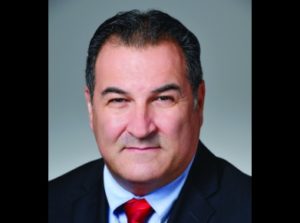The day the Intermountain Jewish News speaks with Israel Maimon, president and CEO of Development Corporation for Israel, is the deadline in Israel for a political party to file to run in April’s election. The previous 24 hours were filled with last-minute political moves, from the emergence of a new centrist coalition to the floating of a right-wing coalition whose inclusion of an extremist party garnered criticism across the American Jewish spectrum.
Although in a non-political role now, Maimon worked at the top levels of Israeli government, including as government secretary under Prime Minister Ariel Sharon. Our conversation presents a unique opportunity to get an insider’s take on election upheaval in Israel.
While he “tries to stay out of politics,” Maimon is insightful and forthcoming about political developments.
He succinctly sums up the last 70 years of Israel politics. “I have not seen a new [political] map,” he says. Nearly every election cycle a centrist party emerges, such as the Democratic Movement for Change in 1977, Kadima in 2005 or Yesh Atid in 2012, but they don’t have staying power. In fact, most cease to exist.
This time around, however, Maimon says, “The political envelope is changing.” Possible reasons, he says, are Benjamin Netanyahu’s length of tenure as prime minister (10 years) and the shadow of an indictment hanging over him.
In response to Netanyahu reaching out to far-right parties, Kachol Lavan, a centrist coalition has come together, which Maimon calls a “small boom.” It brings together three political parties, but more significantly it unites top Israeli political leadership, namely Yesh Atid’s Yair Lapid and three former IDF Chiefs of Staff, Benny Gantz, seen currently as Bibi’s primary rival, Moshe Yaalon and Gadi Eisenkot.
While Netanyahu remains in a strong position, suddenly he no longer seems infallible, observes Maimon. These “new forces are interesting,” he says, but predicts more changes before April’s election.
While current global politics don’t favor center parties, Maimon sees in Israel a historic trend behind their lack of performance. The political map, he says, “leans on pre-State forces,” with today’s left and right the inheritors of the left and right forces that existed in pre-State Israel, namely Histadrut and Irgun, and that emerged as the original political forces in the newborn state, Mapai and Herut, respectively.
The center, Maimon says, “is not rooted in Israeli society. It reflects that part of society that’s looking for something fresh.”
Being prime minister, he says, is a hard road to travel, along which one acquires the scars of political life. “One must mature to the position,” says Maimon, and not every political leader has the long-term commitment to travel that road.
Meanwhile, back to his current job, Israel Bonds.
When Maimon first came to Denver last year, Israel Bonds was just opening its local office, under the leadership of Sarah Prostak. In addition to Colorado, the regional office serves Arizona, Nevada, Utah and Wyoming.
A year later, meeting with the newly formed local advisory council, he’s pleased at the progress, noting especially the “will” of the council’s lay leadership.
“We have new investors and partnerships with other organizations,” he says, which according to Prostak, include JEWISHcolorado and local synagogues such as DAT Minyan and HEA.
While Diaspora Jewry, he says, generally supports Israel Bonds and the Jewish state, there have been some internal issues, such as conversion, “where we’ve heard voices that say ‘we’ve had enough.’”
Because Israel Bonds is a government bond, potential investors who feel that Israel’s internal policies have affected them personally may be more hesitant to invest. “It’s not a flood” of people, says Maimon, “but it’s there.”
What he never does is give up trying to explain. “I try to explain the difference between the government [in power] and the State. It’s the only state of the Jewish people. Some understand the argument. Some did not.
“Israel Bonds is apolitical and it must stay apolitical. We are securing the the development of the state. The majority gets that, but some decided not to buy or renew.”
Where he has felt no pushback at all, Maimon says, is with regards to US politics. Both red and blue states are buying bonds, and “we don’t feel BDS. On the contrary, states have actually changed their policies so that they can invest in Israel Bonds.”
“We cannot ignore what the BDS movement is doing at universities, [influencing] scholars, but when it comes to government it is weak.”
He posits that people in government may be equipped with more knowledge about Israel, which he attributes to the hard of work of American Jewish organizations like AIPAC.
As Israel Bonds grows in the region, it’s likely that Maimon will be back. Visits to Colorado come with a perk for Maimon: his two “fruitful days” of Israel Bonds business were preceded by snowboarding in the majestic Rockies.
Shana Goldberg may be reached at [email protected]
Copyright © 2019 by the Intermountain Jewish News

















